Everything you (probably) already know about New Year’s resolutions
It’s already New Year’s resolutions time! What is the purpose, and what about the motivations, pain points, and behaviors associated with New Year’s resolutions?
It’s probably everything you already know about New Year’s resolutions, but it may support your process!
- What is a New Year’s resolution?
- What is the origin of a New Year’s resolution?
- Why do we make New Year’s resolutions?
- What are the benefits of making New Year’s resolutions?
- The science of New Year’s resolutions and willpower
- Statistics
- Why do people fail to keep their New Year’s resolutions?
- New Year’s resolutions and Comfort Zone Shake-Up
It’s that time of the year again. While we have been all busy doing something not necessarily on our resolution list from this year, it’s time to start over again.
I am proudly part of the 40% of the US population who is very happy to invest time, effort, and all my passion into analyzing, thinking, discovering, testing, designing, and pursuing my New Year’s resolution plan. Yes, indeed. I am a New Year’s resolution advocate. More than that, beyond the New Year, I am a resolution promoter.
I believe that with the right mindset, every second, every day, every Monday, every beginning of the month, every beginning of the quarter, the semester, and each new season are great moments to start something new.
I have been experiencing that feeling of expanding my Comfort Zones for so long now that I cannot stop anymore. And it is with all my enthusiasm that I try to spread a message: it’s always possible to shake up our Comfort Zones. It’s always possible to improve!
People are more open to discussing new projects and goals right now, between the end of December and the beginning of January. This is the time of the year when the resolution season reaches its peak as we approach the New Year. So, I cannot miss the opportunity to grab your attention!
We can start with an ordinary New Year’s resolution list and change our life!
1. What is a New Year’s resolution?
The Merriam-Webster dictionary provides this definition:
“A New Year’s resolution is a promise to do something differently in the New Year.”
According to Wikipedia:
“A New Year’s resolution is a tradition in which a person resolves to change an undesired trait or behavior, to accomplish a personal goal or otherwise improve their life.”
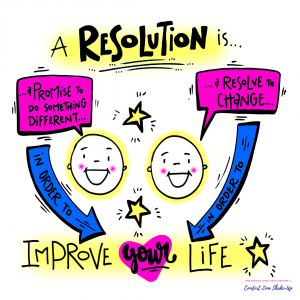
Wikipedia mentions “a tradition,” which sparked my curiosity.
2. What is the origin of New Year’s resolutions?
According to history.com:
“The custom of making New Year’s resolutions has been around for thousands of years, but it hasn’t always looked the way it does today.”
The ancient Babylonians were the first people who made New Year’s resolutions—4,000 years ago. In ancient Rome (yes, in Italy!!!) circa 46 B.C., Julius Caesar established January 1 as the beginning of the New Year. Christians, Methodists, Protestants, and others contributed to the evolution of the concept.
I also found this curious: according to wonderopolis.org,
“January is named after Janus, a mythical god of early Rome. Janus had two faces—one looking forward, one looking backward. This allowed him to look back on the past and forward toward the future. On December 31, the Romans imagined Janus looking backward into the old year and forward into the New Year.”
What about today?
“…New Year’s resolutions today are a mostly secular practice. Instead of making promises to the gods, most people make resolutions only to themselves, and focus purely on self-improvement (which may explain why such resolutions seem so hard to follow through on).”
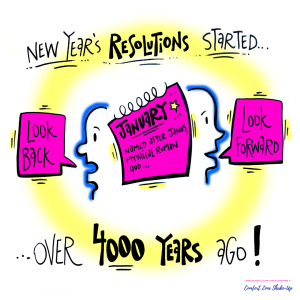
3. Why do we make New Year’s resolutions?
Resolutions can come in many forms, but the reasons we make resolutions fall into two important buckets:
- Promises or desires to change something we don’t like. This could be a bad habit or an undesired trait or behavior.
- Promises or desires to add something we like. This could be a positive habit or a new routine or behavior.
The bottom line is the same—we want to improve —but the distinction between the two sets of motivations is crucial. Are we running away from something, or are we running toward something? These mindsets are totally different, and your approach will dictate the type of effort and priorities you need to put in place to achieve your goals.
Knowing what motivates us is crucial.
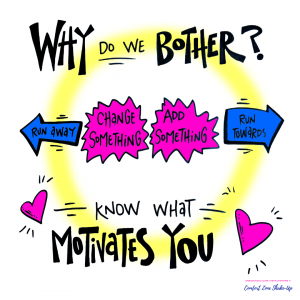
4. What are the benefits of making New Year’s resolutions?
There are at least four different key potential benefits of making New Year’s resolutions:
- Motivation
- Taking control
- Sense of achievement
- Self-esteem
New Year’s resolutions can motivate us—or can keep us motivated—to take action and take control of our lives. We are in charge of our lives, and we can change them. It is a great point to acknowledge. When this happens, we can experience a great sense of achievement that fuels additional motivation and the will to keep going. When this mechanism works, our confidence level skyrockets, as does our self-esteem.
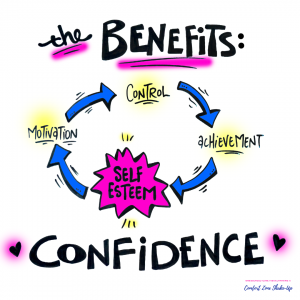
5. The science of New Year’s resolutions and willpower
Ph.D. Psychologist Lynn Bufka, in her article “Making Your New Year’s Resolution Stick,” published on the American Psychological Association website, says that “setting small, attainable goals throughout the year, instead of a singular, overwhelming goal on January 1 can help you reach whatever it is you strive for.”
According to Forbes, there is an emerging body of research led by Stanford University psychologists on willpower and its malleability. Researchers found that people “performed better or worse [on tests] depending on their belief in the durability of willpower.”
This is in line with what I believe: how we speak to ourselves matters.
Forbes’s article reinforces the message.
“You have as much willpower as you think you have. Your journey toward self-improvement is a self-fulfilling prophecy.”
It’s all up to us!
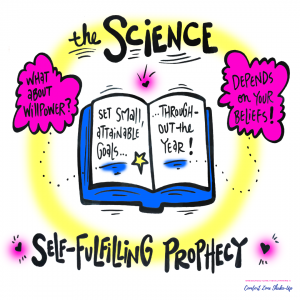
6. Statistics
Let’s dive deeper into numbers!
“More than 40% of Americans make New Year’s resolutions.” —Forbes
“University of Scranton research suggests that just 8% of people achieve their New Year’s goals.” —Forbes
“According to U.S. News, approximately 80% of resolutions fail by the second week of February.” —Business Insider
This is just the top line. If you are curious to learn more, I recommend the following articles from YouGov, and Forbes.
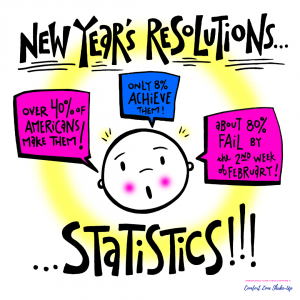
7. Why do people fail to keep their New Year’s resolutions?
Among the reported 92% of people who fail to keep their New Year’s resolutions, there are many different reasons. A quote summarizes well why people fail:
“Shooting for the moon can be so psychologically daunting, you end up failing to launch in the first place.” —Forbes
Even if you launch your plan on January 1st, there’s a good chance that you will fail if you are among the large number of people who are:
- Lacking a good initial assessment
- Setting unrealistic goals / Setting too many goals
- Missing the right mindset
- Losing track of their progress (or not tracking it at all)
The New York Times reports that resolutions often fail because they are not the right resolutions. Most of the time, a resolution is created based on what someone else (our society) tells us. The goal is too vague, and there isn’t a realistic plan to achieve it.
If the list of excuses can be extended, one question remains: What is the secret of the 8% of people who succeed?

8. New Year’s resolutions and Comfort Zone Shake-Up
I support the idea of expanding our Comfort Zones instead of jumping out of them. I see a parallel between the pitfalls of the New Year’s resolutions and the traditional way we talk about the Comfort Zone.
Shooting for the moon and having unrealistic (and sometimes competing) goals is like jumping outside—and too far—from our Comfort Zones. The idea is fascinating, but the reality is that only 8% of people succeed, and we should do much better.
If we want to be part of the 8% of people who succeed in keeping their New Year’s resolutions—or even more than that, if we want to improve —we should start small and from within ourselves.
We can start with an ordinary New Year’s resolution and change our lives!
New Year’s resolutions can be seen as good practice to shake up our Comfort Zones. For both, we should have more of an organic process of micro-steps and small accomplishments.
This time, in thinking about your New Year’s resolutions:
- Start with YOU
- Expand your Comfort Zones
- Design your WOW (AKA your goals!)
It’s time to shake things up and make a New Year’s resolution plan that sticks. After all, we all want to achieve our goals, our WOW! Don’t we?
Happy New Year!
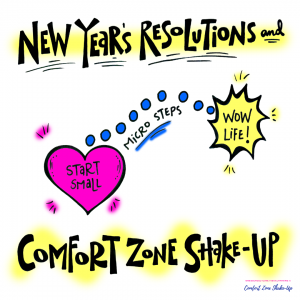
Drawings by Melinda Walker – One Squiggly Line Visual Thinking





